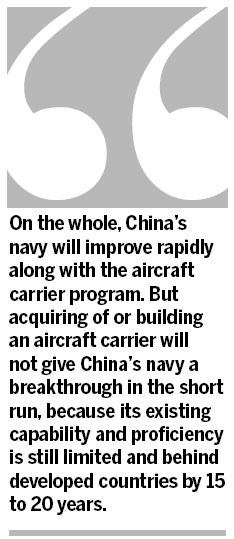The addition of an old aircraft carrier, Varyag, to China's navy has evoked mixed responses from the international community, with some countries interpreting it as a threat. The truth is that the development of China's navy, including the acquiring of the aircraft carrier, is aimed at defending the country's sovereignty and maritime interests and maintaining regional and world peace and stability.
Among the five permanent members of the United Nations Security Council and emerging powers such as Brazil, China is the last to commission an aircraft carrier. Nine countries, including India and Thailand, own the 20 aircraft carriers that are in service across the world, and some others are expediting their efforts to build more.
The Unites States Navy intends to replace the Nimitz-class carriers with Ford-class super-carriers by 2015. The British Royal Navy is building two Queen Elizabeth-class aircraft carriers to replace the Invincible-class warships by 2020. And countries like Russia, France and India have renewed their aircraft carrier programs.
China has huge overseas interests to defend, and as a permanent member of the UN Security Council, it has to shoulder lots of international responsibilities. But the lack of large naval vessels has handicapped its marine activities such as escorting merchant vessels, and anti-terrorism and emergency relief operations.
As a seagoing airbase, aircraft carriers can perform multi-missions in the seas and oceans. Aircraft carriers became a vital part of warfare during World War II and have also played a key role in emergency situations such as the 2004 Indian Ocean tsunami and the massive earthquake and tsunami that hit Japan on March 11 this year.
Abiding by United Nations regulations and international rules, China has more than enough reason to develop aircraft carriers. Some countries have overreacted to the Chinese navy's modernization drive, including acquiring of aircraft carriers, and put a lot of pressure on it by playing up the "China threat" theory to ruin China's development environment and thwart its peaceful rise.
Despite that, China will go ahead with its navy's modernization and plan to build aircraft carriers to defend its sovereignty and maritime interests and fulfill its international responsibilities. It makes no sense to see this determination as threatening.

On the whole, China's navy will improve rapidly along with the aircraft carrier program. But acquiring of or building an aircraft carrier will not give China's navy a breakthrough in the short run, because its existing capability and proficiency is still limited and behind developed countries by 15 to 20 years.
Some people argue that the aircraft carrier will be more of a symbol than a practical strategic tool. But this is not true. An aircraft carrier signifies a new phase of development for the Chinese navy. For a country like China that has faced scores of intrusions from the sea by imperialist powers, an aircraft carrier would boost the morale of its armed forces.
Since an aircraft carrier is a warship, it has a very important military value and can be used as a deterrent against other countries. Aircraft carriers have played a crucial role in sea battles since World War II. Moreover, the information age has made it easier to equip an aircraft carrier with high-tech gadgets and systems to make it highly effective during sea, air or land battles or electronic warfares.
The importance of aircraft carriers has been tested during some regional wars even after the Cold War, and there is no doubt that they will continue to play a decisive role in sea battles. Even the rapid development of other weapons and platforms has not changed the dominant role of aircraft carriers at sea.
For long, China's navy lacked the capability to escort cargo ships and neutralize threats in distant seas. And even though it can now escort merchant vessels to and from the Gulf of Aden and the waters off Somalia's coast, and help protect ships of other countries, China's national interests still face threats.
China has disputes over islands and its maritime boundary. Besides, its foreign-based institutions, personnel and assets are not effectively protected. Its strategic shipping routes are not well protected either, making the smooth supply of fuel vulnerable. Given such challenges, China's navy should shoulder more responsibilities and expedite its modernization drive to pave way for the country's peaceful development.
Peace is the common pursuit of China and the rest of the world, and Beijing has stuck (and will always stick) to its defensive defense policy. The ongoing process of military modernization will not change any of that.
But global waterways are still insecure. Some other countries have forcibly occupied some of China's islands and their surrounding waters, and other maritime resources. China will exercise self-restraint in resolving such disputes through peaceful talks. But the disputing countries should know that China's pursuit of peace does not necessarily mean it will allow them to erode its core national interest.
The author is a senior captain and director of Naval Research Institute of the People's Liberation Army.
(China Daily 08/11/2011 page9)